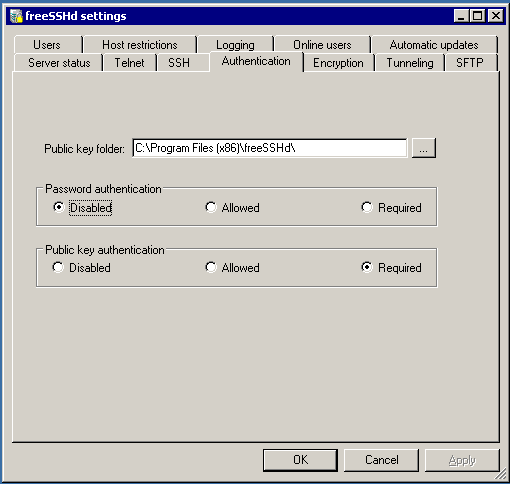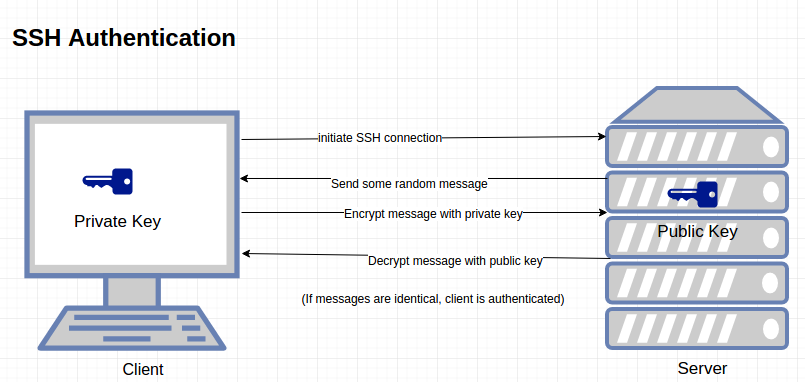This is an unusual topic since most distribution create these keys for you during the installation of the OpenSSH server package. But it may be useful to be able generate new server keys from time to time, this happen to me when I duplicate Virtual Private Server which contains an installed ssh package.
4.3 Git on the Server - Generating Your SSH Public Key. Generating Your SSH Public Key. Many Git servers authenticate using SSH public keys. The key fingerprint is: 2c:3f:a4:be:46:23:47:19:f7:dc:74:9b:69:24:4a:44 xahria@mydesktop. Ssh mydesktop$ scp idrsa.pub ssh-server:idrsamydesktop.pub. Fetch public host keys. The ssh-keyscan command was developed so that users can obtain public host keys without needing to authenticate to the SSH server. From its man page: ssh-keyscan is a utility for gathering the public ssh host keys of a number of hosts. It was designed to aid in building and verifying sshknownhosts files. Adding your key to your hosts. If you have not already, add your public key to the targeted host. Open a command prompt on the server you're adding and edit the authorized keys file for the user specified during server setup. Sudo vi /.ssh/authorizedkeys; Append the public key you generated to the end of the file, save, and exit. Once you’ve done this, you’ll want to deploy your public key to the Windows Server 2019 server that you want to use SSH key based authentication with. To do this, perform the following steps (where chancellor is the name of the user account you’re configuring SSH key based authentication for).
Ssh Server Key Bits
OpenSSH require different keys depending if you use SSH1 and/or SSH2 protocol. All keys are generated by ssh-keygen, that one should be available on your system with the ssh package. The receipt is almost the same as for generating your own keys, except that you should use an empty passphrase. Default key lengths are also appropriate (2048 bits for rsa and 1024 bits for dsa)
SSH1 protocol
For SSH1 protocol, you need a rsa1 key generated has follow:
SSH2 protocol
For SSH2 protocol, you need two keys, one RSA key and one DSA key generated has follow:

Since January 2011, OpenSSH also support ECDSA key, you may generate a new one using:
-->This topic covers the Windows-specific configuration for OpenSSH Server (sshd).
OpenSSH maintains detailed documentation for configuration options online at OpenSSH.com, which is not duplicated in this documentation set.
Configuring the default shell for OpenSSH in Windows
The default command shell provides the experience a user sees when connecting to the server using SSH.The initial default Windows is the Windows Command shell (cmd.exe).Windows also includes PowerShell and Bash, and third party command shells are also available for Windows and may be configured as the default shell for a server.
To set the default command shell, first confirm that the OpenSSH installation folder is on the system path.For Windows, the default installation folder is SystemDrive:WindowsDirectorySystem32openssh.The following commands shows the current path setting, and add the default OpenSSH installation folder to it.
| Command shell | Command to use |
|---|---|
| Command | path |
| PowerShell | $env:path |
Configuring the default ssh shell is done in the Windows registry by adding the full path to the shell executable to ComputerHKEY_LOCAL_MACHINESOFTWAREOpenSSH in the string value DefaultShell.
As an example, the following Powershell command sets the default shell to be PowerShell.exe:
Windows Configurations in sshd_config
In Windows, sshd reads configuration data from %programdata%sshsshd_config by default, or a different configuration file may be specified by launching sshd.exe with the -f parameter.If the file is absent, sshd generates one with the default configuration when the service is started. Descargar libro buenos dias espiritu santo benny hinn pdf.
The elements listed below provide Windows-specific configuration possible through entries in sshd_config.There are other configuration settings possible in that are not listed here, as they are covered in detail in the online Win32 OpenSSH documentation.
AllowGroups, AllowUsers, DenyGroups, DenyUsers
Controlling which users and groups can connect to the server is done using the AllowGroups, AllowUsers, DenyGroups and DenyUsers directives.The allow/deny directives are processed in the following order: DenyUsers, AllowUsers, DenyGroups, and finally AllowGroups.All account names must be specified in lower case.See PATTERNS in ssh_config for more information on patterns for wildcards.
When configuring user/group based rules with a domain user or group, use the following format: user?domain*.Windows allows multiple of formats for specifying domain principals, but many conflict with standard Linux patterns.For that reason, * is added to cover FQDNs.Also, this approach uses '?', instead of @, to avoid conflicts with the username@host format.
Work group users/groups and internet-connected accounts are always resolved to their local account name (no domain part, similar to standard Unix names).Domain users and groups are strictly resolved to NameSamCompatible format - domain_short_nameuser_name.All user/group based configuration rules need to adhere to this format.
Examples for domain users and groups
Examples for local users and groups
AuthenticationMethods
For Windows OpenSSH, the only available authentication methods are 'password' and 'publickey'.
AuthorizedKeysFile
The default is '.ssh/authorized_keys .ssh/authorized_keys2'. If the path is not absolute, it is taken relative to user's home directory (or profile image path). Ex. c:usersuser. Note that if the user belongs to the administrator group, %programdata%/ssh/administrators_authorized_keys is used instead.
ChrootDirectory (Support added in v7.7.0.0)

This directive is only supported with sftp sessions. How to get gta 5 for mac for free. A remote session into cmd.exe wouldn't honor this. To setup a sftp-only chroot server, set ForceCommand to internal-sftp. You may also set up scp with chroot, by implementing a custom shell that would only allow scp and sftp.
HostKey
The defaults are %programdata%/ssh/ssh_host_ecdsa_key, %programdata%/ssh/ssh_host_ed25519_key, %programdata%/ssh/ssh_host_dsa_key, and %programdata%/ssh/ssh_host_rsa_key. If the defaults are not present, sshd automatically generates these on a service start.
Match
Note that pattern rules in this section. User and group names should be in lower case.
PermitRootLogin
Ssh Server Key
Not applicable in Windows. To prevent administrator login, use Administrators with DenyGroups directive.
SyslogFacility
If you need file based logging, use LOCAL0. Logs are generated under %programdata%sshlogs.For any other value, including the default value, AUTH directs logging to ETW. For more info, see Logging Facilities in Windows.
Not supported
Ssh Server Key
The following configuration options are not available in the OpenSSH version that ships in Windows Server 2019 and Windows 10 1809:
Ssh Server Key Changed
- AcceptEnv
- AllowStreamLocalForwarding
- AuthorizedKeysCommand
- AuthorizedKeysCommandUser
- AuthorizedPrincipalsCommand
- AuthorizedPrincipalsCommandUser
- Compression
- ExposeAuthInfo
- GSSAPIAuthentication
- GSSAPICleanupCredentials
- GSSAPIStrictAcceptorCheck
- HostbasedAcceptedKeyTypes
- HostbasedAuthentication
- HostbasedUsesNameFromPacketOnly
- IgnoreRhosts
- IgnoreUserKnownHosts
- KbdInteractiveAuthentication
- KerberosAuthentication
- KerberosGetAFSToken
- KerberosOrLocalPasswd
- KerberosTicketCleanup
- PermitTunnel
- PermitUserEnvironment
- PermitUserRC
- PidFile
- PrintLastLog
- RDomain
- StreamLocalBindMask
- StreamLocalBindUnlink
- StrictModes
- X11DisplayOffset
- X11Forwarding
- X11UseLocalhost
- XAuthLocation
